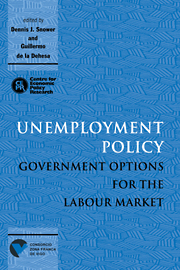Book contents
- Frontmatter
- Contents
- List of figures
- List of tables
- Preface
- Acknowledgements
- List of conference participants
- 1 Introduction
- PART ONE GENERAL POLICY ISSUES
- PART TWO DEMAND MANAGEMENT AND SUPPLY-SIDE POLICY
- PART THREE SUBSIDISING EMPLOYMENT AND TRAINING
- PART FOUR LABOUR MARKET REGULATIONS
- 12 An analysis of firing costs and their implications for unemployment policy
- Discussion
- Discussion
- 13 Labour market regulation and unemployment
- Discussion
- PART FIVE POLICY, JOB REALLOCATION AND THE UNEMPLOYMENT–PRODUCTIVITY RELATION
- PART SIX COMPARING UNEMPLOYMENT POLICIES
- Index
Discussion
Published online by Cambridge University Press: 07 September 2010
- Frontmatter
- Contents
- List of figures
- List of tables
- Preface
- Acknowledgements
- List of conference participants
- 1 Introduction
- PART ONE GENERAL POLICY ISSUES
- PART TWO DEMAND MANAGEMENT AND SUPPLY-SIDE POLICY
- PART THREE SUBSIDISING EMPLOYMENT AND TRAINING
- PART FOUR LABOUR MARKET REGULATIONS
- 12 An analysis of firing costs and their implications for unemployment policy
- Discussion
- Discussion
- 13 Labour market regulation and unemployment
- Discussion
- PART FIVE POLICY, JOB REALLOCATION AND THE UNEMPLOYMENT–PRODUCTIVITY RELATION
- PART SIX COMPARING UNEMPLOYMENT POLICIES
- Index
Summary
Gregg and Manning's chapter 13 runs contrary to the current intellectual fashion in economics which considers that labour market rigidity is largely responsible for the high level of unemployment seen at present in the majority of OECD countries. In other words, economists belonging to the dominant stream of thinking state that by decreasing labour market rigidity, unemployment will decrease as well.
Gregg and Manning's central message can be summarised in a few points: (i) perfect competition does not exist in the labour market and therefore the monopsony power of firms and ‘aristocracy workers’ ought to be compensated by an equivalent level of bargaining power of unskilled workers; (ii) to minimise unemployment one must adopt an optimal level of regulation; (iii) zero regulation does not necessarily result in zero unemployment. Personally, I believe that Gregg and Manning are right.
In the analytical framework of de-regulation, the labour market is considered to be more important than the goods and services markets in combating the unemployment problem. In Europe, this approach has been criticised several times by Blanchard, Drèze, Malinvaud, Morishima and Pasinetti, among others. Economists who start with the hypothesis that the goods and services markets are in equilibrium whilst the labour market is unbalanced, underestimate, to a certain extent, real interest rates, production capacity and demand, and will therefore naturally tend to focus their attention on the labour market, neglecting the others.
- Type
- Chapter
- Information
- Unemployment PolicyGovernment Options for the Labour Market, pp. 424 - 430Publisher: Cambridge University PressPrint publication year: 1997



